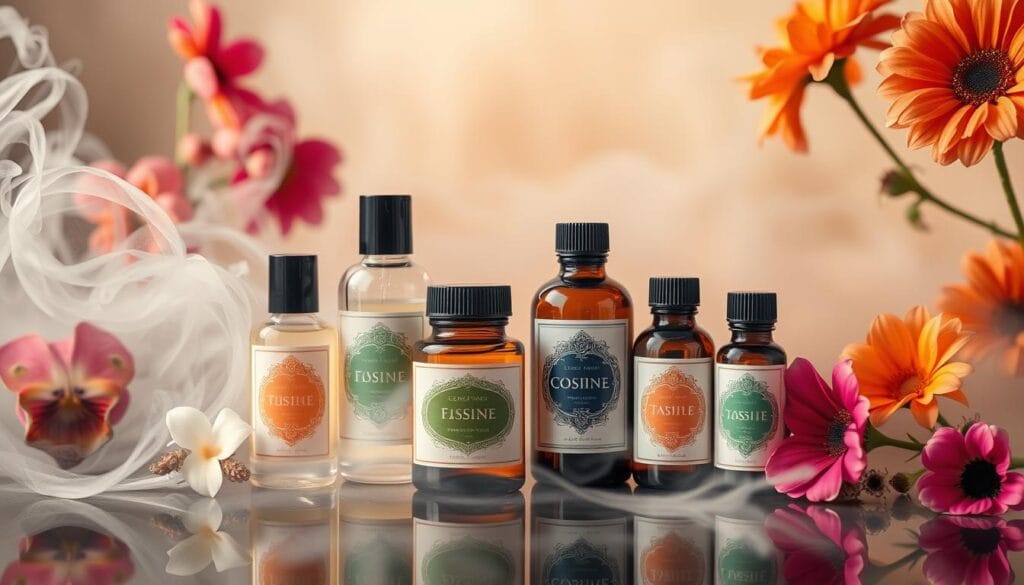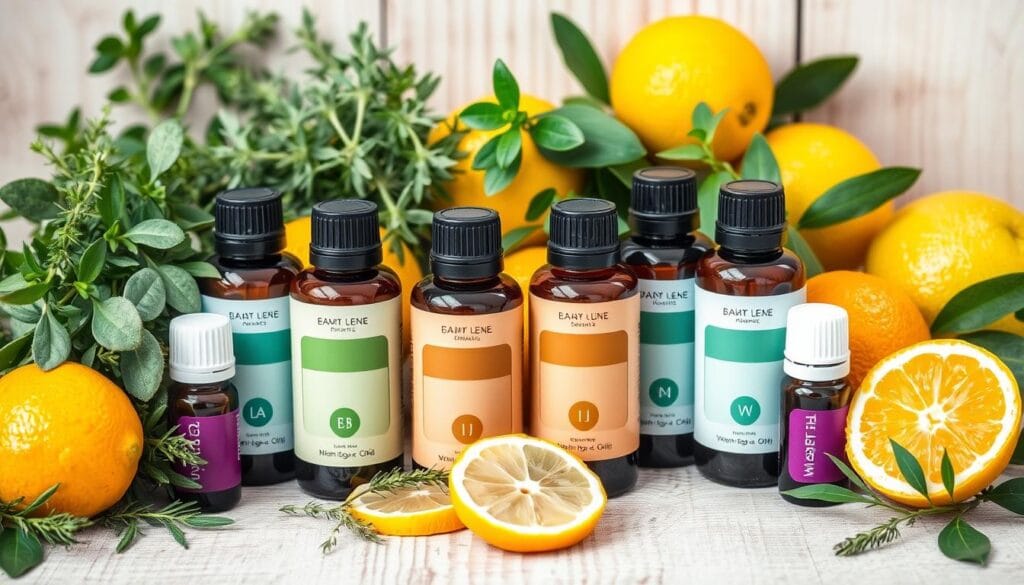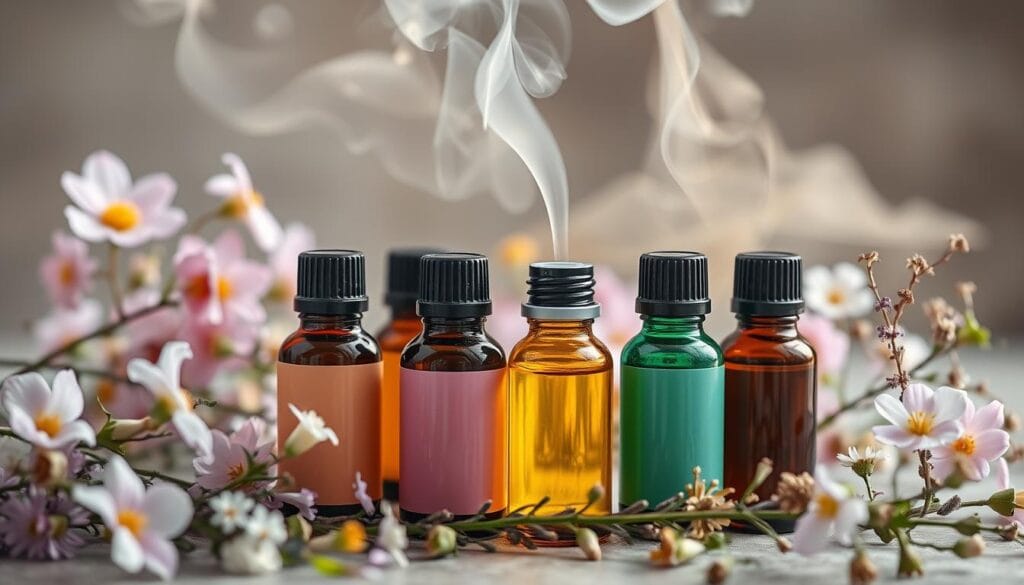שמני אתרוג הוערכו ברפואה עממית מאז עשורים. תמציות אלו מרוכזות מתוך צמחים ומשתמשות בכוחם של טבע לריפוי הוליסטי. ארומתרפיה משתמשת בשמני אתרוג כדי לפעול על המערכת הריחנית, ומרוויחת פופולריות בתחום הטיפול הטבעי.
המערכת הריחנית קשורה בצורה צמוקה למערכת הלימבית של המוח. חיבור זה מאפשר לשמני אתרוג להשפיע על מצב הרוח ורמות הלחץ שלנו. ארומתרפיה יכולה לקדם רגיעה, להפחית חרדה ולשפר את בהירות המחשבה.
שמני אתרוג מציעים יתרונות שונים לגוף ולנפש. ניתן למרוח אותם על העור, לשאוף אותם או להשתמש בהם בשמנים לעיסוי. שמנים אלו הם פתרונות טבעיים לצרכים שונים.
הם יכולים להקל על תחושת נוחות פיזית כמו שרירים תפוסים או כאבי ראש. שמני אתרוג משפרים גם את הרווחת הרגשית על ידי הפחתת הלחץ ועזרה בשינה. המאפיינים הטבעיים שלהם הופכים אותם לבחירה יעילה למגוון רב של אנשים.
מסקנות מרכזיות
- שמני אתרוג הם מרוכזים
תמציות צמחים המשמשות בארומתרפיה לריפוי הוליסטי
- הארומתרפיה מעוררת את המערכת הריחנית, משפיעה על רגשות ורווחה
- שמני אתרים ניתן לנשום, למרוח על העור, או להשתמש בהם בעיסוי למגוון רווחים
- הם מציעים רווחה טבעית מתוך תחושת נוחות פיזית ותמיכה באיזון רגשי
- הארומתרפיה היא כלי עוצמתי להפחתת מתח, חרדה, וקידום הרגעה
מהם שמני האתרים?
שמני האתרים הם תמציות צמחים מרוכזות. הם מגיעים מפרחים, עלים, גבעולים, שורשים, וקליפה. נוזלים עזים אלו תופסים את הטעם והתכונות הרפואיות של הצמח.
שמני האתרים מציעים ניחוחות ייחודיים. הם משמשים מאז ומעולם בארומתרפיה, ברפואה טבעית, ובמוצרי טיפוח אישיים.
הגדרה ושיטות חילוץ
שמני האתרים מתקבלים דרך שיטות חילוץ שונות. שיטות אלו שומרות על הרכב הכימי והתועלתי של הצמח. שתי שיטות חילוץ נפוצות משמשות.
- זיקוק בקיטור: הקיטור עובר דרך חומר צמחי, מאדיף שמנים אתריים. האדיפה מתקררת ומתכלה לשמן אתרי טהור.
- צירוף קר: משמש בעיקר לשמנים ציטרוסיים. קליפת הפרי מודפסת כדי לשחרר שמנים, שנאספים ומסננים אותם.
היסטוריה של שמנים אתריים ברפואה מסורתית
שמנים אתריים נעשה בהם שימוש מאות שנים. האזרחויות העתיקות הכירו את חשיבותם הרפואית והרוחנית. המצרים, היוונים והסינים כללו אותם בפרקטיקות הרפואה המסורתיות.
- במצרים העתיקה, שמנים אתריים הושמשו בטקסים דתיים ובתהליכי יופי. הם אף הושמשו לשמירה על מומיות.
- היוונים והרומאים השתמשו בשמנים אתריים לריפוי. הם גם השתמשו בהם בארומתרפיה, מסאז' ורחיצה.
- הרפואה הסינית משתמשת מזמן בשמנים אתריים. נאמר עליהם שמאזנים אנרגיה ומקדמים בריאות כללית.
"שימוש בשמנים אתריים לצורך תרפיה, רוחניות והיגייניות תיעוד בתרבויות עתיקות מסוימות, כולל מצרים, סין והודו."
שמנים אתריים עדיין מוערכים בגלל היתרונות השונים שלהם גם היום. הם משמשים בארומתרפיה, בטיפוח העור, בריפוי הוליסטי ובמוצרי ניקוי לבית.
כיצד שמנים אתריים פועלים
שמנים אתריים הם תרכובות צמחיות עוצמתיות שמשפיעות על הרווחה הפיזית והרגשית. תרכובות אלו עובדות דרך ספיגה דרך העור ובאינטראקציה עם המערכת הריחנית. הן מפעילות אפקטים פיזיולוגיים בגוף.
ספיגה דרך העור והזנקה
שמנים אתריים נכנסים לגוף דרך ספיגה דרך העור. כאשר מוחלים אותם מקומית, המולקולות הקטנות שלהם חודרות בעור ונכנסות לזרמי הדם. שיטה זו יעילה לבעיות מקומיות כמו כאבי שרירים או גירוי עור.
ההזנקה היא דרך נוספת שבה שמנים אתריים משפיעים על הגוף והמוח. כאשר מוזנחים, התרכובות הגזיות שלהם מעוררות רקטורים ריחניים באף. זה שולח הודעות ישירות למערכת הלימבית של המוח.

השפעה על המערכת הלימבית
המערכת הלימבית מנהלת רגשות, זיכרון והתנהגות. שמנים אתריים שנשאפים יכולים לגרום לתגובות רגשיות על ידי התקשרות עם מערכת זו. הם משפיעים על מצב רוח, רמות לחץ ופונקציה קוגניטיבית.
שמן לבנדר מקדם רגיעה ומפחית חרדה על ידי תיקון פעילות הניורוטרנסמיטרים. נענה ורוזמרין משפרים בהירות נפשית וריכוז על ידי עידון שונה של המערכת הלימבית.
השפעה על הבריאות הפיזית והרגשית
הרכב הכימי של כל שמן אתרי קובע את ההשפעה שלו על הגוף והנפש. חלק מהשמנים, כמו שמן עץ התה ואקליפטוס, מכילים תכונות אנטימיקרוביות. אלה תומכות בפעילות החיסונית ובבריאות הנשימה.
זנגביל ונענע יכולים לסייע בעיכול ולהקל על הקאה. שמנים אתריים גם משפיעים על רווחת הרגשות על ידי גרירת תגובות ספציפיות דרך המערכת הלימבית. הם יכולים להפחית סטרס, לשפר מצב רוח, ולקדם שקט ואיזון.
| שמן אתרי | תועלת רגשית | אפקט פיזיולוגי |
|---|---|---|
| לבנדר | מפחית חרדה ומעודד רגיעה | מוריד רמות קורטיזול ומשפר איכות שינה |
| נענע | משפר בהירות דעת וריכוז | מקל על כאבי ראש ומשפר עיכול |
| ברגמוט | מרומם את המצב הרוח ומפחית מתח | מוריד לחץ דם וקצב לב |
| ילנג-ילנג | מעודד רגיעה ורוגע | מאזן הורמונים ומפחית דלקת |
שמנים אתריים מציעים מגוון רחב של תועלות פיזיות ורגשיות דרך מנגנונים שונים. הם עוזרים לקידום רווחה ואיזון דרך ספיגה בעור, נשימה, ואינטראקציה עם המערכת הלימבית.
שמנים אתריים לבריאות פיזית
שמנים אתריים מציעים פתרונות טבעיים למגוון בעיות בריאות פיזית. הם מספקים רווחה מכאבים, מחזקים את החיסון, סייעים בעיכול, ומקדמים רווחת נשימה. הבריתות העוצמתיים הללו יכולים לעזור לשמור על רווחה כללית בצורה טבעית.
טיפול בכאבים ומאפיינים נגד-דלקתיים
שמני נענע, זנגביל, וכורכום מכילים מאפיינים המקלים על כאבים ומסייעים במאבק נגד דלקת. הם יכולים לסייע בניהול כאבי ראש, כאבי מפרקים, וכאבי שרירים. שמנים אלו מציעים אלטרנטיבה עדינה לתרופות כאב מסורתיות.
"שמן נענע אתרי הוכח כיעיל בהפחתת כאבי ראש מתישים ובספק רווחה מכאבי שרירים."
חיזוק פעולת החיסון
שמני אקליפטוס, עץ התה, ואורגנו מכילים מאפיינים אנטימיקרוביים ומחזקי חיסון. הם מגןים על הגוף מפתגנים ומזיקים. שימוש יומיומי בשמנים אלו יכול לחזק את המערכת החיסונית שלך ולשמור על בריאות אופטימלית.

שיפור העיכול ובריאות הנשימה
שמני נענע, זנגביל ושומר מסייעים בעיכול על ידי הפחתת נפיחות, כאבים בבטן ובחילות. הם מרגיעים בטנים חולים ומקדמים עיכול בריא. שמנים אלה מספקים רווחה טבעית לבעיות עיכול נפוצות.
שמני אקליפטוס ונענע מועילים לבריאות הנשימה. הם מנקים נזקים, פותחים את הדרכי אוויר ומקדמים נשימה קלה. ניתן להשתמש בשמנים אלה באידוי או במפיץ ריח כדי להקל על תסמיני קור ואלרגיה.
| שמן אתרי | יתרונות בריאות פיזית |
|---|---|
| נענע | הקלה על כאבים, עזר לעיכול, תמיכה בנשימה |
| זנגביל | נגד דלקת, עזר לעיכול, הקלה על בחילות |
| אקליפטוס | תמיכה במערכת החיסון, תמיכה בנשימה, הקלה על נזקקות |
| עץ התה | נגד חיידקים, תמיכה במערכת החיסון, בריאות עור |
שמנים אתריים תומכים בבריאות פיזית בצורה טבעית והוליסטית. הם מציעים יתרונות ממוקדים להקלה על כאבים, לחיזוק החיסון, לעיכול ולבריאות הנשימה. כלול אותם בסדרת הטיפוח האישי שלך כדי לקדם רווחה כללית.
שמנים אתריים לאיזון רגשי
שמנים אתריים תומכים ברווחת רגשית ומקדמים איזון. הם עוזרים לנהל מתח, להפחית חרדה ולשפר מצב רוח. ארומתרפיה משתמשת במאפיינים הרפואיים שלהם כדי לגדל רווחת רגשית גדולה יותר.
שמן לבנדר מרגיע ומקל על מתח. הריח המרגיע שלו משקיט את הדעת ומקל על מתח. שמן ברגמוט מעלה את המצב רוח ומפחית חרדה עם הניחוח הלימוני שלו.

שמן ילנג-ילנג מרגיע את המערכת העצבית ומקל על מתח. הריח המתוק והפרחוני שלו משקיע את הרגשות ומכניס שקטות. הוא עוזר להשיג איזון רגשי.
"שמני אתרים יש להם את הכוח לשנות את מצב הרוח שלנו, להביא שיווי משקל והרמוניה לנפש ולרוח." – טיפולת ארומה, סרה תומפסון
שמנים ציטרוס כמו לימון, תפוז וגרפרות מעלים ומחיים. הם מעודדים חושים, מעלים בהירות מנטלית ומעודדים שמחה. שמנים אלה עוזרים לגרש לינה ולקבל תפיסה חיובית.
שמן ורד, יסמין ואלון הסנדל מטפחים את הרווחה הרגשית. ורד פותח את הלב, מעודד אהבה וריפוי. יסמין מעלה ביטחון ומדליק תשוקה.
אלון הסנדל משקיט את המוח ומקל על טורמו הרגשי. הוא מעודד שלווה פנימית ועוזר למרכז רגשות. שמנים אלה הם לא יקרים לאהבת עצמי ולחיבור.
| שמן אתרי | יתרונות רגשיים |
|---|---|
| לבנדר | הקלה על מתח, רגיעה, הפחתת חרדה |
| ברגמוט | שיפור מצב רוח, הפחתת חרדה, שלום פנימי |
| ילנג-ילנג | הקלה על מתח, איזון רגשי, שקט |
| לימון | שיפור מצב רוח, בהירות מנטלית, שמחה |
| ורד | ריפוי רגשי, אהבת עצמי, רחמים |
| ז'סמין | שיפור מצב רוח, ביטחון עצמי, חושניות |
| אלון השיטה | רווחה רגשית, שלום פנימי, יציבות |
בחרו שמנים שמתאימים לצרכי הרגשות שלכם לחוויית ארומתרפיה אישית. פיזור, הוספה לאמבט או החלה כבושם. שמני הצמחים מציעים דרך טבעית להעדיף בריאות רגשית.
בחירת ושימוש בשמנים אתריים בצורה בטוחה
בטיחות ואיכות הן חשובות בעת השימוש בשמנים אתריים. בחרו בשמנים טהורים ממקורות אמינים למרב היתרונות. חפשו מותגים שפתוחים לגבי שיטותיהם ומציעים מוצרים ללא תוספות.
שיקולים של איכות וטהרה
תמיד דללו שמנים אתריים עם שמן נשא לפני החלה על העור. זה מונע גירוי ועוזר בספיגה. שמן קוקוס, חוחובה או שקדים עובדים טוב כנשאים.
יחסי דילול משתנים לפי השמן וגורמים אישיים. ייעוץ ממקורות אמינים או ארומתרפיסט מוסמך להנחייה בשימוש בטוח.
שיטות דילול ויישום
שמנים אתריים לא מתאימים לכולם. נשים בהריון, ילדים ואנשים עם מצבי בריאות צריכים להיות זהירים. ייעוץ עם ספק רפואי לפני השימוש.
כמה שמנים עשויים להשפיע על תרופות או להחמיר בבעיות בריאות. למדו על האזהרות לגבי השימוש בשמנים ספציפיים שתתכננו להשתמש בהם.
עקבו אחרי ההנחיות לביטחון ובקשו עזרה מקצועית כאשר נדרש. זה מבטיח שימוש בטוח ויעיל של שמנים אתריים בתוכנית הטיפוח שלכם.












